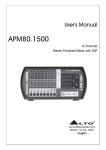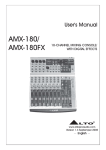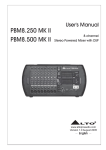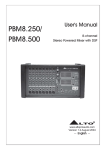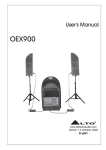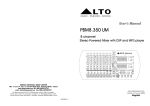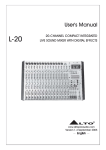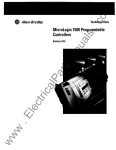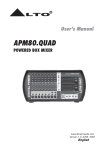Download Alto APM80.1000 User`s manual
Transcript
User's Manual APM80.1000 8-channel Stereo Powered Mixer with DSP R LTO www.altoproaudio.com Version 1.0 Jan. 2007 English Fuse SAFETY RELATED SYMBOLS To prevent fire and damage to the product, use only the recommended fuse type as indicated in this manual. Do not short-circuit the fuse holder. Before replacing the fuse, make sure that the product is OFF and disconnected from the AC outlet. CAUTION RISK OF ELECTRIC SHOCK DO NOT OPEN This symbol, wherever used, alerts you to the presence of un-insulated and dangerous voltages within the product enclosure. These are voltages that may be sufficient to constitute the risk of electric shock or death. Protective Ground Before turning the product ON, make sure that it is connected to Ground. This is to prevent the risk of electric shock. This symbol, wherever used, alerts you to important operating and maintenance instructions. Please read. Never cut internal or external Ground wires. Likewise, never remove Ground wiring from the Protective Ground Terminal. Protective Ground Terminal Operating Conditions AC mains (Alternating Current) Always install in accordance with the manufacturer's instructions. Hazardous Live Terminal ON: To avoid the risk of electric shock and damage, do not subject this product to any liquid/rain or moisture. Do not use this product when in close proximity to water. Denotes the product is turned on. OFF: Denotes the product is turned off. WARNING Do not install this product near any direct heat source. Describes precautions that should be observed to prevent the possibility of death or injury to the user. Do not block areas of ventilation. Failure to do so could result in fire. CAUTION Keep product away from naked flames. Describes precautions that should be observed to prevent damage to the product. IMPORTANT SAFETY INSTRUCTIONS Read these instructions Disposing of this product should not be placed in municipal waste and should be Separate collection. Follow all instructions Keep these instructions. Do not discard. Heed all warnings. WARNING Only use attachments/accessories specified by the manufacturer. Power Supply Ensure that the mains source voltage (AC outlet) matches the voltage rating of the product. Failure to do so could result in damage to the product and possibly the user. Power Cord and Plug Do not tamper with the power cord or plug. These are designed for your safety. Unplug the product before electrical storms occur and when unused for long periods of time to reduce the risk of electric shock or fire. Do not remove Ground connections! External Connection Protect the power cord and plug from any physical stress to avoid risk of electric shock. If the plug does not fit your AC outlet seek advice from a qualified electrician. Always use proper ready-made insulated mains cabling (power cord). Failure to do so could result in shock/death or fire. If in doubt, seek advice from a registered electrician. Do not place heavy objects on the power cord. This could cause electric shock or fire. Cleaning When required, either blow off dust from the product or use a dry cloth. Do Not Remove Any Covers Within the product are areas where high voltages may present. To reduce the risk of electric shock do not remove any covers unless the AC mains power cord is removed. Do not use any solvents such as Benzol or Alcohol. For safety, keep product clean and free from dust. Servicing Covers should be removed by qualified service personnel only. No user serviceable parts inside. Refer all servicing to qualified service personnel only. Do not perform any servicing other than those instructions contained within the User's Manual. 1 PREFACE Dear customer Thank you for choosing the LTO APM80.1000 8-channel stereo powered mixer with DSP, which is the result of our LTO AUDIO TEAM's endeavours. For the LTO AUDIO TEAM, music and audio are more than a profession, it is a passion and an obsession! We have, in fact, been designing professional audio products for a number of years in cooperation with many of the world's major brands. The LTO line represents unparalleled analogue and digital products made by musician, for musicians. With our design centres in Italy, the Netherlands, and United Kingdom we provide you with world-class designs, while our software development teams continue to develop an impressive range of audio specific algorithms. By purchasing our LTO products you become the most important member of our LTO AUDIO TEAM. We would like to share with you our passion for what we design and invite you to make suggestions, which will aid us in developing future products for you. We guarantee you our commitment for quality, continual research and development, and of course the best prices. The LTO APM80.1000 is extremely flexible, ultra-low noise 8-channel stereo powered mixer with DSP, which is configured with six MIC/line and two stereo inputs channels, each of them is equipped with a variety of key features including a 3-band equalizer, two aux sends and pan control etc.. Besides, the miraculous DSP with 256 presets and powerful digital power amplifier will meet your requirements. To deserve to be mentioned, the output power of LTO APM80.1000 is 2 500W.Seeing is believing, let's meet the LTO APM80.1000. We would like to thank all the people who made the LTO APM80.1000 possible, especially to our designers and LTO staff. It is their passion for music and professional audio that has made it possible for us to offer you, our most important team member, our continued support. Thank you very much LTO AUDIO TEAM 2 TABLE OF CONTENTS 1. INTRODUCTION.....................................................................................................................................4 2. FEATURES..............................................................................................................................................5 3. QUICK START..........................................................................................................................................6 4. CONTROL ELEMENTS...........................................................................................................................7 4.1 MONO/STEREO Input Channel Section 4.2 MASTER SECTION Control 4.3 MASTER SECTION INPUT and OUTPUT Jacks 4.4 DSP Section 4.5 Rear Panel 5. PRESET LIST.........................................................................................................................................14 6. INSTALLATION AND CONNECTION ....................................................................................................15 6.1 Audio Connections 6.2 Speaker Connections 6.3 Possible System Connection Mode for Live Sound Application 7. TECHNICAL SPECIFICATION...............................................................................................................19 8. WARRANTY...........................................................................................................................................21 3 1. INTRODUCTION Thank you very much for expressing your confidence in LTO products by purchasing LTO APM80.1000 8channel stereo powered mixer with DSP. The APM80.1000 is professional, powerful mixer, which provides the state of the art digital amplifier technology specifically. You will get the smooth, accurate more natural and open sound from this apparatus, it is really ideal for large gigs, recording and fixed PA installations. The APM80.1000 8-channel stereo powered mixer with DSP is packed with some key features. For example: there is six MIC/line inputs which provided with ultra low noise microphone pre-amplifiers and phantom power at +48V plus two stereo inputs, each of them features a 3-band equalizer, two aux sends, pan and level control. The master section includes stereo return, 2-track input/output for playing back stereo devices for recording your mix, sweet equalizers for main and monitor, 256 position multieffect and built-in feedback terminator and so on. Though APM80.1000 is very easy to operate, we strongly recommend you to go through each section of this manual carefully, in this way you will get the best out of APM80.1000. 4 2. FEATURES The APM80.1000 8-channel stereo powered mixer with DSP is designed for professional application. It provides the following features: Digital amplifier technology, offering high power and a very dynamic sound 9-band graphic EQ for MAIN / MONITOR Built-in feedback terminator 6 MIC/line input channels with gold plated XLRs and balanced LINE inputs 2 Stereo input channels with balanced TRS jacks Ultra-low noise discrete MIC preamps with +48V phantom power Extremely high headroom offering more dynamic range 3-band equlizer on input channels Each input channel with -20dB PAD, PAN and level control 2 AUX sends for built-in or external effects, on-stage monitor mix, or headphone mixing 256 position multieffect 2-track recording IN/OUT (phono) Headphone output 2 500 watt EIAJ amplifiers (For APM80.1000) Output connector: 6.3 jack + 4 way-speakon 5 3. QUICK START 3.1 Please check the AC Voltage available in your country before connecting APM80.1000 to the AC socket. 3.2 Be sure that the main power switch is turned off before connecting the Mixer to the AC socket. Also, you should make sure that all input and output controls are turned down. This will avoid damages to your speakers and avoid excessive noise. 3.3 Please connect one side of the speaker cable to speakon or phone jacks of APM80.1000 and the other side to the input socket of your speaker cabinet; or connect one side to the main output L/R of APM80.1000and other side to the input socket of your active speaker cabinet or other stereo power amplifier. 3.4 Complete these connections as illustrated. 3.5 When no external power amplifier or active speaker connected to the main output L/R of APM80.1000, please switch on APM80.1000 after turning on all external devices; after using, switch off APM80.1000 before all external devices. 3.6 When the external power amplifier or active speaker connected to the main output L/R of APM80.1000, please switch on APM80.1000 before the external power amplifier or active speaker. After using, switch Off APM80.1000 after the external power amplifier or active speaker. 3.7 Before disconnecting the APM80.1000 always turn-off the power switch. 3.8 Do not use solvents to clean your APM80.1000. A dry and clean cloth will be OK. Active speaker 2 Passive speaker 2 Passive speaker 2 6 4. CONTROL ELEMENTS 7 4.1 MONO/STEREO Input Channel Section Your APM80.1000 comprises 6 mono input channels and 2 stereo input channels, each of them including -20dB PAD, 3-band equalizer, AUX sends, PAN and LEVEL controls. The following content will detail the each part. CH 7-8 CH 6 R LINE IN (bal.) (MONO) 1 MONO Input Channels (1 ~ 6) L LOW NOISE P RE A P 2 RE A M P Note: You shall never connect an unbalanced microphone to the XLR connector if you do not want to damage both the microphone and the mixer. LOW NOISE P M There are CH1 through CH6, which comes with MIC IN and LINE IN connector. Use the XLR MIC IN connector to connect low noise microphones preamp and low level signal, which also feature +48V phantom power, allowing you to connect condenser microphones. Use the 1/4" TRS LINE IN connector to connect either a microphone or a line level instrument such as synthesizers, drum machines, effects processors... 1 2 1 3 3 MIC IN (bal.) MIC IN (bal.) 1 2 2 STEREO Input Channels (7 ~ 10) -20 dB PAD There are CH7 through CH10. They are organised in stereo pair. Via the 1/4" TRS input connectors, you can connect the outputs from stereo devices such as synthesizers, effects processor or any stereo line level signal. If only the right jack was connected, the input will operate in mono mode. Via the XLR MIC IN connector, you can input the low level signal. 3 0dB HIGH 12KHz +15dB -15dB 0dB MID 3 -20dB PAD Button Pressing this button will attenuate the input signal by 20dB. In such way you can produce increased headroom and reduce the risk of distortion because of level peaks at input level when the input signal is quite hot. 4 2.5KHz -15dB +15dB 0dB LOW 80Hz 4 EQUALIZER -15dB +15dB 0dB APM80.1000 features a 3-band equalizer allowing you adjust the high, mid and low frequencies separately on each channel. All bands provide up to 15dB of boost or cut, flat at the center detent. MON AUX1 PRE 0dB HIGH This is the treble control. You can use it to get rid of high frequency noises or to boost the sound of cymbals or the high harmonics of the human voice. LOW This is the bass control. It is used to Boost male voice or kickdrum and bass guitar. Your system will sound much bigger than what it is. 8 DSP/FX AUX2 POST 6 +10dB 8 - PAN 7 Left Right 0 dB 8 - 8 MID This is the midrange control. It can affect most fundamental frequencies of all musical instruments and human voice. An attentive use of this control will give you a very wide panorama of sound effects. +10dB 8 - 5 +10dB LEVEL 5 MON (AUX1) Control APM80.1000 has two auxiliary sends which can be used for sending signals to external or internal effects device or for creating a monitor mix, they are used to adjust the level of respective channel signal sent to AUX bus, and the adjustable range goes from - to +10dB. The AUX1 control is configured as PRE-FADER, which means that the signal is sent out before reaching the channel fader. It is used for a monitor mix in a live sound mixing, or for a headphone mix in recording application. 6 DSP/FX (AUX2) Control The AUX2 control is configured as POST-FADER, so the audio signal will be affected by channel fader. Via the AUX2 OUT jack, the AUX2 signal can be sent to an external effects device, furthermore, the AUX2 signal can also be assigned to internal onboard effect module. 7 PAN Control Abbreviation of PANORAMA control for mono and stereo channels. It is used to determine the amount of channel signal sent to left and right of main mix. Keep this control in center position, then the signal will be positioned in middle of stage. Turn this control fully counterclockwise, the signal will be present only on the left of main mix and vice-versa. 8 Channel LEVEL Control This control is used to adjust the overall level of respective channel. The adjustable range goes from - to +10dB. 4.2 MASTER SECTION Controls 12 9 10 11 9 STEREO GRAPHIC EQ APM80.1000 is equipped with both stereo graphic EQs, one is for MAIN MIX; another for MONITOR MIX, each of them provides 9-band fader controls. Via these faders, you can boost or attenuate the selected frequency by 15dB at a preset bandwidth. When all faders are at the center position, the output of the equalizer is flat response. They are used to modify the frequency "contour" of a sound. The EQ function will be activated automatically as soon as you operate APM80.1000. 10 FEEDBACK TERMINATOR Button (MONITOR MIX) Pressing this button the automatic feedback detection function will be activated in monitor signal path. When a frequency band fader lights up, it means the level of this frequency band is too high, i.e. there is a little feedback occurring in this frequency band, which may result in unpleasant speaker "howling" or " whistling " . In this case, in order to eliminate feedback, you need to turn down the corresponding fader. 9 11 MONITOR LEVEL Control This control is used to adjust the level of monitor output. 12 MONITOR LEVEL LED Display This LED display is used to monitor the monitor output level. 15 9 13 14 13 FEEDBACK TERMINATOR Button (MAIN MIX) Pressing this button the automatic feedback detection function will be activated in main mix signal path. When a frequency band fader lights up, it means the level of this frequency band is too high, i.e. there is a little feedback occurring in this frequency band, which may result in unpleasant speaker "howling" or "whistling" . In this case, in order to eliminate feedback, you need to turn down the corresponding fader. 14 MAIN MIX LEVEL Control This control is used to adjust the overall volume of main mix output. 15 MAIN MIX LEVEL LED Display The stereo 4 segments LED display is used to monitor the main mix output level. 16 16 OPERATING LED Display The LED indicates when the power is switched on in APM80.1000. 10 17 PHANTOM 48V Switch It is available only to the XLR MIC sockets. Never plug in a microphone when phantom power is already on. Before turning phantom power on, make sure that all faders are all the way down. In this way you will protect your stage monitors and main loudspeakers. Pushing the switch to right will apply +48V phantom power only to the 8 XLR microphone inputs. 18 17 18 AMPLIFIER MODE Switch This switch provides three modes: MAIN/MAIN; MAIN/MONITOR; BRIDGE. Select any one of these modes to specify the signals to be routed to the corresponding jacks according to the speaker connection at speaker jacks on the rear panel. The details refer to later content. 4.3 MASTER SECTION INPUT and OUTPUT Jacks 19 20 21 19 MONITOR OUT Jack Use the balanced MONITOR jack to connect the input of external monitor amplifier or active monitor speaker. 20 MAIN OUT Jacks The both jacks are used to output the main mix signal to an external amplifier or active speaker. 21 HEADPHONE OUT Jack This is a stereo phone type output jack, it is used to send out the monitor signal to a pair of headphones. 22 AUX2 OUT Jack The phone jack is used to output the line level signal of AUX2 bus. Generally, it is available to connecting effects unit. AUX2 OUT 22 23 STEREO RTN. Jack Use the stereo phone jack to return the sound of an effect unit to the main mix. You can also use it as the extra auxiliary inputs. 11 STEREO RTN 23 24 TAPE TO Select Switch Pushing this switch to left will route the signal from TAPE IN to CH9~10 path, and the signal will be affected by channel level control and main level control, while to right will route the signal to main mix bus, the signal will be affected only by main level control. 24 25 2-TRACK IN APM80.1000 features dual RCA jacks for 2-track in (left and right). If you wish to listen to your mix from a tape recorder, DAT or cassette, please use these tape input jacks. Depending on the setting of TAPE TO select switch, you can assign the signal coming from the tape recorder (DAT or cassette) to CH9~10 path or main mix bus. 25 26 26 2-TRACK OUT DSP APM80.1000 features dual RCA jacks for 2-track out (left and right). Via these jacks, you can route the main mix signal into a tape recorder or DAT for recording. PRESETS 16 1 2 15 3 4 14 5 13 4.4 DSP Section APM80.1000 features the special 256 position multi-effect, further details please refer to following content. 27 6 12 7 11 10 9 8 CLIP 29 30 DSP MUTE MUTE VARIATIONS 27 PRESETS Control 16 Adjust this knob to select the right effect you wish to perform. There are total 16 options for you: several kinds of reverb, mono and stereo delay, modulation effects, and versatile two-effect combination. 1 2 15 3 4 14 5 13 28 6 12 7 11 10 9 8 28 VARIATIONS Control Since you have selected the preferable effect, the next step, please go with the fine consideration, there are also total 16 variations for each preset, and each variation has been designed modifying several parameters. DSP - 8 TO MON 31 +10dB PRESETS: 29 DSP MUTE Switch This switch is used to activate/deactivate the effect facility. Sometimes, you can also use the following FOOT SW jack for convenient operation 1. VOCAL 1 2. VOCAL 2 3. LARGE HALL 4. SMALL HALL 5. LARGE ROOM 6. SMALL ROOM 7. PLATE 8. TAPE REVERB 9. SPRING REVERB 10. MONO DELAY 11. STEREO DELAY 12. FLANGER 13. CHORUS 14. REVERB + DELAY 15. REVERB + FLANGER 16. REVERB + CHORUS 30 CLIP/MUTE LED 0 dB This LED lights up when the input signal is too strong. In case of the digital effect module being muted, this LED also lights up. DSP - 8 TO MAIN 32 +10dB 31 DSP TO MON Control This control is used to control the volume of effect signal sent to monitor mix, which can be varied from - to +10dB. 12 FOOT SW. 33 32 DSP TO MAIN Control This control is used to control the volume of effect signal sent to main mix bus, which can be varied from +10dB. to 33 FOOT SW. Jack Here, you can connect an external footswitch to turn on/off the onboard effect module. It is 1/4" phone jack. 4.5 Rear Panel 34 R LTO POWERED MIXER MODEL: APM80.1000 POWER ON OFF LEFT/MONO MAIN OUTPUT 2 1+ 1POS NEG VOLTAGE SELECTOR CAUTION RISK OF ELECTRIC SHOCK DO NOT OPEN WARNING: SHOCK HAZARD - DO NOT OPEN AVIS: RISQUE DE CHOC ELECTRIQUE - NE PAS OUVRIR AC CAUTION: ~100-120 VAC OUTPUT 2 220 - 240VAC~50Hz RATED POWER CONSUMPTION:650W 2 500 W @ 4 OHM 2 270 W @ 8 OHM OUTPUT 1 ~220-240 VAC 110-120V STEREO MODE: INPUT 100 - 120VAC~60Hz REPLACE WITH THE SAME TYPE FUSE AND RATING DISCONNECT SUPPLY CORD BEFORE CHANGING FUSE (4 OHM MIN. LOAD) BRIDGE MODE: 1000 W @ 8 OHM 220-240V (8 OHM MIN. LOAD) CLASS 2 WIRING MAY BE USED FUSE: 100~120V: T8A250V 220~240V: T5A250V BRIDGE MODE RIGHT/MONITOR BRIDGE 2+ 1+ POS NEG OUTPUT 1 1+ 1POS NEG MODEL Apparaten skall anslutas till jordat uttag nar den ansluts till ett natverk SERIAL 35 36 37 34 POWER ON/OFF Switch This switch is used to turn the main power ON and OFF. 35 AC Inlet with FUSE Holder Use it to connect APM80.1000 to the main AC with the supplied AC cord. Please check the voltage available in your country and how the voltage for APM80.1000 is configured before attempting to connect APM80.1000 to the main AC. 36 SPEAKERS Jacks These jacks are used to connect speakers. They are configured with 4-way speakon connectors and 1/4" phone jacks. You can determine the signal that is output to these jacks according to the setting of AMPLIFIER MODE select switch. Note: In order to avoid damaging your built-in amplifier, please pay more attention to the impedance of speaker. Lower load impedances are not permitted. 37 AC Select Switch This switch has two choices for voltage, 115 VAC or 230 VAC. Note: If you want to switch the voltage, remove the cover plate with a screwdriver and set the switch to the 115 VAC or 230VAC as the actual requirement. Refer to the specification page 20 for instructions of replacing fuse. 13 7. PRESET LIST No. Preset Description Controllable parameter Parameter Variable range 1 VOCAL 1 Simulate a room with small delay time. Decay time Pre-delay 0.8~1.1s 0~79ms 2 VOCAL 2 Simulate a small space with slight decay time. Decay time Pre-delay 0.8~2.5s 0~79ms 3 LARGE HALL Simulate a large acoustic space of the sound. Decay time Pre-delay 3.6~5.4s 23~55ms 4 SMALL HALL Simulate a small acoustic space of the sound. Decay time Pre-delay 1.0~2.9s 20~45ms 5 LARGE ROOM Simulate a studio room with many early reflections. Decay time Pre-delay 6 SMALL ROOM Simulate a bright studio room. Decay time Pre-delay 0.7~2.1s 20~45ms 7 PLATE Simulate the transducers sound like classic bright vocal plate. Decay time Pre-delay 0.6~6.1s 10ms 8 TAPE REVERB Simulate a record head and multiple playback heads Decay time at intervals along the tape. Pre-delay 1.3~5.4s 0~84ms 9 SPRING REVERB Simulate the analog transducers' springs lightly Decay time Pre-delay stretched sound. 1.3~5.4s 0~35ms 10 MONO DELAY Reproduce the sound input on the outputafter a Period lapse of time. 60~650ms 11 STEREO DELAY Recreate the input sound on the stereo output with Period Feedback different time. 210~400ms 37~73% 12 FLANGER Simulate to play with another person carryingout Rate sam e the notes on the same instrument 0.16~2.79Hz 13 CHORUS Recreate the illusion of more than one instrument Rate from a single instrument sound 0.5~5Hz 14 REV.+DELAY Delay with room effect Delay period Rev. decay time 211~375ms 1.0~2.9s 15 REV.+FLANGER Stereo chorus and large room reverb Flanger Rate Rev. decay time 0.16~2.52Hz 1.5~2.9s 16 REV.+CHORUS Simulate the sound effect achieved by rotating horn Chorus rate Rev. decay time speakers and a bass cylinder 14 2.9~4.5s 23~55ms 0.5~4.74Hz 1.5~2.9s 6. INSTALLATION AND CONNECTION Ok, you have got to this point and you are now in the position to successfully operate APM80.1000. However, We advise you to read carefully the following section to be the real master of your own mix. Not paying attention enough to the input signal level, to the routing of the signal and the assignment of the signal will result in unwanted distortion, a corrupted signal or no sound at all. So you should follow this procedure for every single channel: Turn down all input and output gain controls. Connect phantom powered microphones before switching on the +48Volt phantom power switch. Set the output level of APM80.1000 or the connected power amplifier at no more than 75%. Now, set the MONITOR level at no more than 50%. In this way you will be able to hear later what you are doing connecting a pair of headphones or a pair of powered studio monitor speakers. Position EQ controls on middle position. Position panoramic (PAN) control on center position. Increase the input gain properly for maintaining the good headroom and ideal dynamic range. Depending on the actual application, turn slowly the input and output level controls for obtaining the maximum gain before distortion. Now repeat the same sequence for all input channels. The main LED meter could move up into the red section. In this case you can adjust the overall output level through the MAIN MIX control. 6.1 Audio Connections You can connect unbalanced equipment to balanced inputs and outputs. Simply follow these schematics. Ring=Right Signal Tip Sleeve Ring Strain Clamp Tip=Left Signal Sleeve=Ground/Screen Use for Headphone 1/4" Stereo (TRS) Jack Plug Sleeve Tip Tip=Signal Strain Clamp Sleeve=Ground/Screen Use for Mono Line In, Mono 1/4"Jack Plugs 1/4" Mono (TS) Jack Plug 15 Ring=Return Signal Tip Sleeve Ring Strain Clamp Tip=Send Signal Sleeve=Ground/Screen Use for Insert Points 1/4" Stereo (TRS) Jack Plug 2=Hot(+) 2 1 3 2 2=Hot(+) 1=Ground/Screen 1 3 3=Cold(-) 1=Ground/Screen 3=Cold(-) Use for Balanced Mic Inputs (For unbalanced use, connect pin 1 to 3) Use for Main output (For unbalanced use, leave pin 3 unconnected) 3-pin XLR Male Plug 3-pin XLR Line Socket (seen from soldering side) (seen from soldering side) 6.2 Main Speaker Connections Please use only the power connectors to make connections with other signal source equipment for the passive speaker cabinets. The power connector has four terminals: 1+, 1-, 2+, 2-. 1- 2- 1+ 2+ Speakon connector APM80.1000 features three modes for connecting the main speakers. The speaker impedance requirement varies depending on how you connect the speaker. In order to avoid damaging your built-in amplifier, please pay more attention to the impedance of speaker. Lower load impedances are not permitted. The further details, you can refer to the mark on rear panel. CAUTION RISK OF ELECTRIC SHOCK DO NOT OPEN WARNING: SHOCK HAZARD - DO NOT OPEN AVIS: RISQUE DE CHOC ELECTRIQUE - NE PAS OUVRIR CAUTION: REPLACE WITH THE SAME TYPE FUSE AND RATING DISCONNECT SUPPLY CORD BEFORE CHANGING FUSE STEREO MODE: 2 500 W @ 4 OHM 2 270 W @ 8 OHM BRIDGE MODE: 1000 W @ 8 OHM (4 OHM MIN. LOAD) (8 OHM MIN. LOAD) CLASS 2 WIRING MAY BE USED 16 Here some illustrations will give you some helpful suggestions. Main Speaker AMPLIFIER MODE LEFT/MONO MAIN OUTPUT 2 1+ 1POS NEG OUTPUT 2 OUTPUT 1 BRIDGE MODE RIGHT/MONITOR BRIDGE 2+ 1+ POS NEG OUTPUT 1 1+ 1POS NEG MAIN MAIN BRIDGE + + MAIN MONITOR Bridge Mode Main Speaker AMPLIFIER MODE LEFT/MONO MAIN OUTPUT 2 1+ 1POS NEG OUTPUT 2 OUTPUT 1 BRIDGE MODE RIGHT/MONITOR BRIDGE 2+ 1+ POS NEG OUTPUT 1 1+ 1POS NEG MAIN MAIN BRIDGE + + MAIN MONITOR Use either the speakon jacks or phone jacks Monitor Speaker MAIN + MONITOR Mode Main Speaker AMPLIFIER MODE LEFT/MONO MAIN OUTPUT 2 1+ 1POS NEG OUTPUT 2 OUTPUT 1 BRIDGE MODE RIGHT/MONITOR BRIDGE 2+ 1+ POS NEG OUTPUT 1 1+ 1POS NEG MAIN MAIN BRIDGE + + MAIN MONITOR Use either the speakon jacks or phone jacks Main Speaker MAIN + MAIN Mode 17 6.3 Possible System Connection Mode for Live Sound Application Read through the "QUICK START" chapter and previous setting procedures , you will know how to start your system quickly and adjust the channel setting under safety conditions. Here shows the APM80.1000 in a live sound system. The following section explains the basic connection and operating. For input section, connect three or more microphones to mono MIC channels (1~3); connect synthesizers or signal processor to either line input of stereo channel 7~8 or line input of mono channel; connect the CD player to line input of mono or stereo channel; other stereo line signal source can be connected to line input of channel 9~10. For output section, you can connect either an external amplifier or active speaker to the monitor output jack. Through the main output jacks on front panel, you can connect an external power amplifier to driving the 2 sub-woofers or 2 active speakers. Besides, you can connect a pair of headphone to headphone output jack. There are powered mix output connectors on rear panel, through these, you can connect 2 passive main speakers. Normally, more speaker outputs are needed, you can use the AUX2 output jack to connect the power amplifier for driving the studio monitor speaker. If necessary, you can also use the 2-track in/ out connectors to connect the DAT or cassette for recording. R L R LTO POWERED MIXER MODEL: APM80.1000 POWER ON OFF LEFT/MONO MAIN OUTPUT 2 1+ 1POS NEG VOLTAGE SELECTOR CAUTION RISK OF ELECTRIC SHOCK DO NOT OPEN WARNING: SHOCK HAZARD - DO NOT OPEN AVIS: RISQUE DE CHOC ELECTRIQUE - NE PAS OUVRIR AC CAUTION: INPUT ~100-120 VAC 100 - 120VAC~60Hz REPLACE WITH THE SAME TYPE FUSE AND RATING DISCONNECT SUPPLY CORD BEFORE CHANGING FUSE RATED POWER CONSUMPTION:650W 2 500 W @ 4 OHM 2 270 W @ 8 OHM OUTPUT 1 ~220-240 VAC 110-120V STEREO MODE: OUTPUT 2 220 - 240VAC~50Hz (4 OHM MIN. LOAD) BRIDGE MODE: 1000 W @ 8 OHM 220-240V (8 OHM MIN. LOAD) CLASS 2 WIRING MAY BE USED FUSE: 100~120V: T8A250V 220~240V: T5A250V BRIDGE MODE RIGHT/MONITOR BRIDGE 2+ 1+ POS NEG OUTPUT 1 1+ 1POS NEG MODEL SERIAL Apparaten skall anslutas till jordat uttag nar den ansluts till ett natverk Cassette or DAT CD Player Synthesizers ON Other stereo line level signal L Vocal MIC Monitor 18 R 5. TECHNICAL SPECIFICATION Mono input channels Microphone input Frequency response Distortion (THD & N) Gain SNR (Signal to Noise Ratio) Line input Frequency response Distortion (THD & N) Gain >90dB electronically balanced 10Hz to 55kHz, + 3dB 0.04% at + 4dBu, 1kHz 30dB Line input Frequency response Distortion (THD & N) Unbalanced 10Hz to 55kHz, + 3dB 0.006% at +4dBu, 1kHz Microphone input Channel Insert return All other inputs Tape out All other output 1.4kOhm 2.5kOhm 10kOhm or greater 1kOhm 120Ohm Hi shelving Mid bell Low shelving + + + A/D and D/A converters DSP resolution Type of effects 24 bit 24 bit Hall, Room, Vocal & Plate REVERBS Mono & Stereo DELAY (max DELAY TIME 650ms) Chorus, Flanger & Reverb MODULATIONS REVERB+DELAY, REVERB+CHORUS, REVERB+FLANGER combinations 256 16-position PRESET Selector 16-position VARIATION selector electronically balanced, discrete input configuration 10Hz to 55kHz, + 3dB 0.006% at + 4dBu, 1kHz 50dB (MIC) Stereo input channels Impedances Equalization 15dB @12kHz 15dB @2.5kHz 15dB @ 80Hz DSP Section Presets Controls CLIP LED MUTE SWITCH with LED indicator Main Mix Section Noise (Bus noise) Fader 0 dB, channels muted: 85dBr (ref.:+4dBu) Fader 0dB, all input channels assigned and set to UNITY gain: 71dBr (ref.:+4dBu) +27dBu balanced , +22dBu unbalanced, 1/4" jacks +22dBu Max output AUX Sends max out 19 Output Power APM80.1000 Stereo mode: 440W(RMS) @ 4ohm 480W(EIAJ) @ 4ohm 254W(RMS) @ 8ohm 263W(EIAJ) @ 8ohm Bridge mode: 945W @ 8ohm Power supply Main voltage 100-120VAC ~ 60Hz 220-240VAC ~ 50Hz APM80.1000 100 ~ 120V : T8A 250V 220 ~ 240V : T5A 250V Fuse Physical Dimension (W D H) 550mm 220mm 310mm (8.66" 12.20" 21.65") Weight (Net) : 8.0kg (17.63lb) (Gross) : 10.8kg (23.8lb) 20 8. WARRANTY 1. WARRANTY REGISTRATION CARD To obtain Warranty Service, the buyer should first fill out and return the enclosed Warranty Registration Card within 10 days of the Purchase Date. All the information presented in this Warranty Registration Card gives the manufacturer a better understanding of the sales status, so as to purport a more effective and efficient after-sales warranty service. Please fill out all the information carefully and genuinely, miswriting or absence of this card will void your warranty service. 2. RETURN NOTICE 2.1 In case of return for any warranty service, please make sure that the product is well packed in its original shipping carton, and it can protect your unit from any other extra damage. 2.2 Please provide a copy of your sales receipt or other proof of purchase with the returned machine, and give detail information about your return address and contact telephone number. 2.3 A brief description of the defect will be appreciated. 2.4 Please prepay all the costs involved in the return shipping, handling and insurance. 3. TERMS AND CONDITIONS 3.1 LTO warrants that this product will be free from any defects in materials and/or workmanship for a period of 1 year from the purchase date if you have completed the Warranty Registration Card in time. 3.2 The warranty service is only available to the original consumer, who purchased this product directly from the retail dealer, and it can not be transferred. 3.3 During the warranty service, LTO may repair or replace this product at its own option at no charge to you for parts or for labor in accordance with the right side of this limited warranty. 3.4 This warranty does not apply to the damages to this product that occurred as the following conditions: Instead of operating in accordance with the user's manual thoroughly, any abuse or misuse of this product. Normal tear and wear. The product has been altered or modified in any way. Damage which may have been caused either directly or indirectly by another product / force / etc. Abnormal service or repairing by anyone other than the qualified personnel or technician. And in such cases, all the expenses will be charged to the buyer. 3.5 In no event shall LTO be liable for any incidental or consequential damages. Some states do not allow the exclusion or limitation of incidental or consequential damages, so the above exclusion or limitation may not apply to you. 3.6 This warranty gives you the specific rights, and these rights are compatible with the state laws, you may also have other statutory rights that may vary from state to state. 21 SEIKAKU TECHNICAL GROUP LIMITED No. 1, Lane 17, Sec. 2, Han Shi West Road, Taichung 40151, Taiwan http://www.altoproaudio.com Tel: 886-4-22313737 email: [email protected] Fax: 886-4-22346757 All rights reserved to ALTO. All features and content might be changed without prior notice. Any photocopy, translation, or reproduction of part of this manual without written permission is forbidden. Copyright c 2007 SEIKAKU GROUP NF 02705 -1.0























